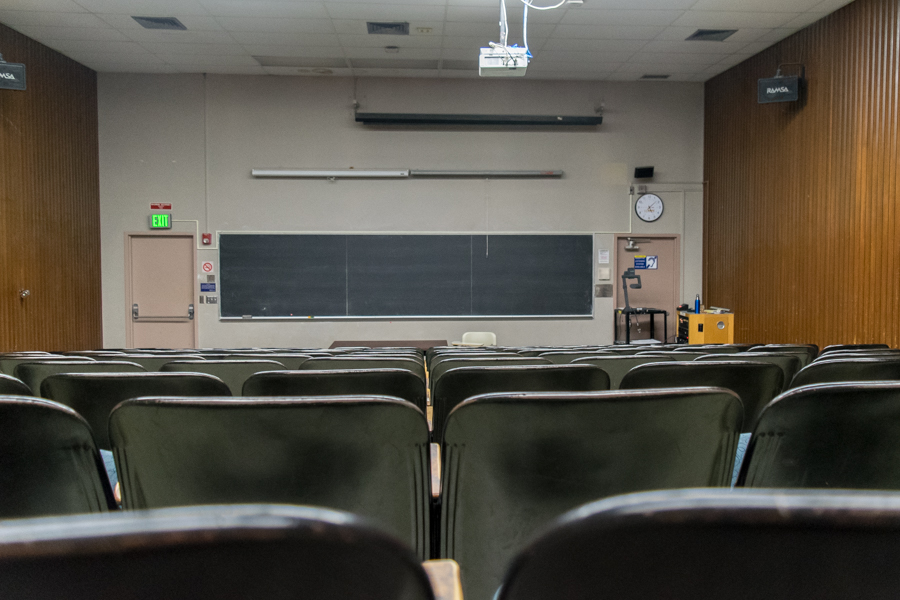
How an unwillingness to debate is creating a toxic campus political environment
According to UCLA researchers, college first-years are more politically polarized today than they have been in over five decades.
The class of incoming college first-years from Fall Quarter of 2016 were, distinctly, the most politically polarized cohort in 51 years, according to a newly released study by the UCLA Higher Education Research Institute (HERI). Using an annual survey to collect data, HERI found that fewer students than ever before (42.3 percent) described their political leanings as “middle of the road,” reflecting an increase in political polarization that has affected the country as a whole.
While the highly contentious 2016 presidential campaign played a major role in increasing political polarization, the aggressive and intentionally provocative actions of campus groups on both the left and right also likely played a crucial part in accelerating the divide. Take, for example, the so-called “Battle of Berkeley,” which saw sporadic incidents of violence erupt between various Antifa organizations and pro-Trump political groups on the UC Berkeley campus. This ultimately cost the university hundreds of thousands of dollars. For a more local example, recall the time that widespread protests on the UC Davis campus shut down a Davis College Republicans-hosted speaking event featuring pharmaceutical executive Martin Shkreli and right-wing provocateur Milo Yiannopoulos, who was also a senior editor at Breitbart News at the time.
So what exactly is causing these conservative speakers to flock to college campuses?
Campus culture in the United States has an undeniably long history of favoring left-leaning politics, even more so among students and faculty associated with university humanities departments. Step into many courses within fields such as political science, American studies or sociology and you will likely find a syllabus outlining concepts such as critical theory, or a reading list dominated by the Marxist intellectuals of the Frankfurt School. These trends are merely a reflection of academia’s composition, where left-leaning professors increasingly dominate these departments. For example, one sample of 8,688 liberal arts professors found a 10.4:1 ratio of registered Democrats to Republicans (the ratio rises to a startling 12.7:1 when the two military colleges in the survey are removed).
It therefore comes as no surprise that college conservatives are likely to project themselves as contrarians. This is reflected in the increasingly popular trend of campus Republican groups to deliberately schedule inflammatory speakers in favor of nuanced intellectuals — largely because these speakers are likely to draw aggressive responses from leftist groups. While this practice may provide these groups with extensive media attention, it also serves to strengthen the political divide among students and decrease the likelihood of open dialogue.
To some degree, however, conservative groups are not entirely to blame for inciting these reactions. When even milquetoast, establishment Republicans like Ben Shapiro are violently protested and labeled as alt-right by leftist protestors, the prospects of insightful political debate become increasingly unlikely.
What college campuses need are open circles of dialogue that aim to provide healthy rhetoric and civil discourse between opposing groups. Scheduling purposefully-incendiary speakers or placing blanket labels over entire political spectrums does not fuel the intellectual growth of a student body. What it does is fan the flames of demagogic collegiate politics, diminishing the academic tradition of open debate and setting the stage for escalating political conflict. Campus political groups should seek to challenge opposing beliefs in a legitimate manner by constructively debating the opposition and not reverting to ideological tribalism. In the end, the demonization of the other benefits no one.
It’s time to grow up.
Written by: Brandon Jetter — brjetter@ucdavis.edu
Disclaimer: The views and opinions expressed by individual columnists belong to the columnists alone and do not necessarily indicate the views and opinions held by The California Aggie.





You are totally correct. The challenge is in overcoming ideological tribalism. It’s too easy, too comforting, too satisfying to indulge in it. A prerequisite for “challenging opposing beliefs in a legitimate manner” is the ability to challenge one’s own beliefs; failure to do so is what leads to the solipsism and self-righteousness that drives the overzealous antagonism of opposing beliefs. Constructive dialog can only take place when people recognize that no one has it all figured out, morally, ethically, or factually, and accordingly that there exists plenty of room for debate.